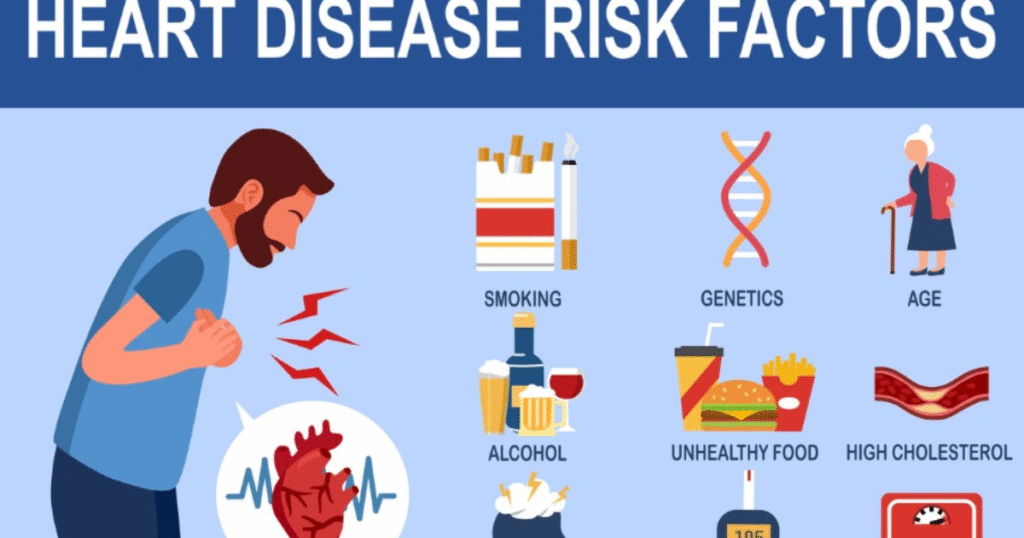Introduction
Heart disease remains one of the leading causes of death globally. Despite advancements in medical science, many people still underestimate the importance of maintaining a healthy heart. The heart is a powerful muscle responsible for pumping blood and oxygen throughout the body—its health is directly linked to your quality of life and longevity.
Understanding the risk factors, adopting heart-friendly habits, and being proactive about your cardiovascular health can lead to a longer, more vibrant life. This comprehensive guide explores key concepts and practical strategies to improve and protect your heart health.
Understanding Heart Health

Why Heart Health Matters
A healthy heart efficiently pumps blood, supports overall organ function, and helps you maintain energy and vitality. When your heart is compromised, it can lead to conditions such as coronary artery disease, heart failure, arrhythmias, and heart attacks.
The Role of the Cardiovascular System
The cardiovascular system includes the heart, blood, and blood vessels. It transports oxygen, nutrients, and hormones to cells and removes waste products. Any dysfunction in this system can affect the entire body.
Common Heart Conditions
Coronary Artery Disease (CAD)
Occurs when the arteries that supply blood to the heart muscle become hardened or narrowed due to plaque buildup.
Heart Attack (Myocardial Infarction)
Happens when a part of the heart muscle doesn’t get enough blood, usually due to a blocked artery.
Heart Failure
A chronic condition where the heart doesn’t pump blood as well as it should.
Arrhythmias
Irregular heartbeats that can lead to various complications if untreated.
Risk Factors for Heart Disease

Modifiable Risk Factors
- High Blood Pressure (Hypertension)
- High Cholesterol
- Smoking
- Physical Inactivity
- Poor Diet
- Obesity
- Diabetes
- Stress
Non-Modifiable Risk Factors
- Age
- Family History
- Gender (men are generally at higher risk earlier in life)
- Ethnicity
Signs and Symptoms to Watch
Warning Signs of Heart Problems:
- Chest pain or discomfort
- Shortness of breath
- Fatigue
- Swelling in legs, ankles, or feet
- Irregular heartbeat
- Dizziness or fainting
Prevention: The Foundation of Heart Health
1. Eat a Heart-Healthy Diet
Foods to Include:
- Fruits and vegetables
- Whole grains
- Lean proteins (especially fish rich in omega-3 fatty acids)
- Nuts and seeds
- Healthy fats like olive oil
Foods to Limit or Avoid:
- Processed foods
- High-sodium items
- Sugary snacks and drinks
- Trans fats and excessive saturated fats
2. Get Regular Physical Activity
Benefits of Exercise:
- Improves blood circulation
- Lowers blood pressure
- Helps control weight
- Reduces stress
Recommendations:
- Aim for at least 150 minutes of moderate-intensity aerobic activity per week
- Include strength training twice a week
3. Maintain a Healthy Weight
Excess weight puts added strain on the heart and increases the risk of high blood pressure, cholesterol, and diabetes.
4. Quit Smoking
Smoking damages blood vessels, reduces oxygen in the blood, and significantly increases the risk of heart disease.
5. Manage Stress Effectively
Chronic stress contributes to heart disease through high blood pressure, inflammation, and unhealthy coping habits like overeating or smoking.
6. Limit Alcohol Intake
Moderate alcohol consumption may have some benefits, but excessive drinking increases blood pressure and heart risks.
7. Monitor Blood Pressure and Cholesterol
Regular check-ups help detect and manage risks before they become serious health problems.
Medical Tests and Screenings

Key Screenings to Consider:
- Blood Pressure Check: Every 1-2 years or as recommended
- Cholesterol Test: Every 4-6 years, or more frequently if at risk
- Blood Glucose Test: To detect diabetes or pre-diabetes
- Electrocardiogram (ECG/EKG): Measures heart rhythm and electrical activity
- Stress Test: Assesses how your heart works during physical activity
The Role of Genetics in Heart Health
While lifestyle plays a major role, genetics can influence cholesterol levels, blood pressure, and susceptibility to certain heart diseases. It’s important to know your family history and discuss it with your healthcare provider.
Medications and Treatment Options
Common Medications:
- Statins: Lower cholesterol
- ACE Inhibitors: Lower blood pressure and protect the heart
- Beta Blockers: Reduce heart rate and blood pressure
- Blood Thinners: Prevent clots
Surgical Options:
- Angioplasty and stents
- Bypass surgery
- Pacemakers
Creating a Heart-Healthy Lifestyle Plan
Step 1: Assess Your Risk
Know your numbers—blood pressure, cholesterol, blood sugar—and discuss your risk with a doctor.
Step 2: Set Realistic Goals
Small, manageable goals are more effective than drastic changes. Start with walking 30 minutes a day or cutting back on salty snacks.
Step 3: Track Progress
Use apps or journals to monitor diet, exercise, and stress levels. Celebrate milestones to stay motivated.
Step 4: Involve Others
Enlist support from family and friends. Healthy habits are easier to maintain with a strong support system.
Step 5: Stay Consistent
Consistency is key. Habits become sustainable when practiced daily.
Also Read : Managing Stress: Techniques For A Calmer, Healthier Life
Conclusion
Caring for your heart is one of the most important investments you can make in your health and future. By understanding the risks, making informed lifestyle choices, and staying proactive with medical check-ups, you can significantly reduce your chances of heart disease.
A strong heart not only enhances physical health but also contributes to emotional and mental well-being. Start with small changes today—your heart will thank you tomorrow.
Frequently Asked Questions (FAQs)
1. What is the best diet for heart health?
The Mediterranean diet is widely considered one of the best for heart health due to its emphasis on fruits, vegetables, whole grains, lean protein, and healthy fats.
2. How often should I get my heart checked?
It depends on your age and risk factors, but most adults should have an annual check-up, including blood pressure and cholesterol screenings.
3. Can stress really affect my heart?
Yes. Chronic stress raises blood pressure, contributes to inflammation, and can lead to unhealthy habits that harm the heart.
4. Is exercise safe for people with heart conditions?
In most cases, yes—with guidance from a healthcare provider. Tailored exercise programs are often recommended for people with heart issues.
5. Are heart problems always hereditary?
Not always. While genetics play a role, lifestyle choices are major contributors to heart disease and can often override genetic predispositions.








